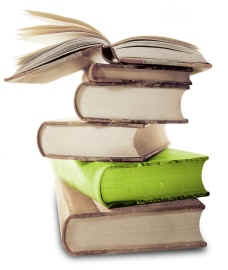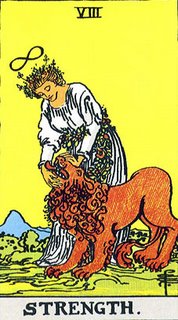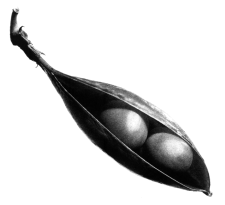Militant Reading
I wish I had the words to describe the pleasure I am getting from my reading lately. I’m falling on my books with a single minded passion, wanting only to devour them faster and faster. I am reading while walking Madam in the stroller (as long as I can stay away from traffic), reading while I nurse her, reading while she crawls around the floor and babbles. I can’t seem to make myself do anything else during my free time. My boxes remain unpacked. My errands remain un-run.
TEG calls it militant reading.
I suppose part of it is sheer relief, and ego. Sheer relief that the molasses of those early months of motherhood is finally thinning and loosening its hold on my mind, and I can concentrate again. In those months, I was so sleep deprived and depressed that I think I would have broken down in tears if you had shown me a book. Now, the mist has lifted. I can think, and let me tell you, it’s like getting my sight back, or my sense of taste. I missed living in my own mind.
The darker side of that is ego. I have, shall we say, issues about being seen as "only a stay at home mother." Why should people presume that I don’t have a wit in my head because I spend most of my day fishing things out of Madam’s mouth and singing "Wheels on the Bus"? So it’s very important to prove, if only to myself, that I am still the smart, interesting person that I was prior to giving birth.
But (you knew there was a but, didn’t you...?) there’s a deeper reason than those.
I’ve always had a complicated relationship with the act of reading. Books have always been the mirror that reflected me to me. I have spent years losing myself again and again in the troubled and exciting lives of characters in novels. I have spent years following the triumphant march of Fact in nonfiction. When I was younger, I read indiscriminately, voraciously...anything that looked interesting, or that was recommended or mentioned by someone or something else that snared my imagination.
It was a happy time.
Then I started college, and reading became fraught with issues of self-esteem and fear and judgment. As an English major, I was expected to have some sort of an innate love for the "classics" and a disdain for "trash". Sometimes that was true, but often I had to pretend. For the first time, I treated books as being outside of me, objects to be dissected and mastered, instead of entered into and loved. Reading also became political. Apparently, I should stop loving those Dead White Males who had shaped much of my early literary experience, because they weren’t writing for people like me. This made me feel unmoored, dislocated.
Post college wasn’t much better. Working at Big Publishing Houses, books were currency, titles thrown around to show how educated you were, how fit to walk the hallowed hallways of the Mecca of Publishing. I felt incredibly behind, like I had wasted years reading books that were being deemed useless by the people around me...like I had invested in a company that was declared bankrupt.
I spent those years lamenting the reading I hadn’t done. I spent those years afraid to tackle those Big Classic Books, afraid that they would expose me to myself (mirrors, again) and that I wouldn’t understand them, would have to face the fact that I was an intellectual fraud. I had a suspicion that the books would hold themselves aloof from me, that the authors "wouldn’t like me, if they knew me." Yes, that’s a direct quote. Poor TEG.
After I left publishing, I wandered around in underemployment and confusion. TEG and I moved on average once a year. I didn’t have a career, just a series of jobs. I had plenty of time and mental energy to read those books that had made me feel so inferior earlier, but, well...I STILL felt inferior. I still wasn’t ready. Not having a career made me feel naked in a room of people wearing suits. If I could have laminated my diploma and thesis and worn them around my neck, I probably would have done it. My mind was like walls closing, defensiveness and ignorance running around and around in the narrow space.
Then came Madam. And with her arrival, a flood of authorly desire was unleashed. I had spent years denying that I COULD be a writer, in part because of these books that hadn’t been a part of my education. But...I wasn’t in school anymore. If I was going to read them, it would have to be self-motivated. If I didn’t understand, I would have to dig deep and find the answers myself. And maybe they WOULD be too difficult for me to understand, maybe they WOULD be written in some code for genii. But something curious happened. Reading stopped being this badge of belonging that I could flash to the cognoscenti. It started to feel urgent, interior, almost secret. If I failed, no one needed to know. And hey, if I could give birth, surely I could pick up a novel by William Faulkner! So thanks to the wonderful library here, I started to tackle those fearsome authors. Woolf, Didion, Updike, Morrison, Walker.
And in my reading, I’ve found myself arguing with the authors, engaging them in my own life, pondering their secrets. I feel like I am learning to read like a writer, finally—like I am shaking hands with them across the span of the page, and the span of lifetimes. I can look past their mystique, the unassailable genius of their work, and see the effort, the humanity. Like my poem below, I am seeing them more and more as Letos, instead of almighty Zeuses giving birth from their heads.
And I am seeing that my own life, my own words, can grow and ripen and matter someday, as well. That I can plunge my hands into the messy, bloody chaos of language and image and fashion them into something beautiful, someday.
To put it simply, I am learning to read for mentors, to find encouraging voices for my own dreams. And every beautiful book I read, with phrases so heady and gorgeous they make me dizzy, is another hand up, another writer cheering me on and saying that they’ll see me on the other side.
It’s not militant reading. It’s my people, meeting me book by book.
Continue reading...







